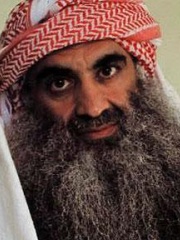
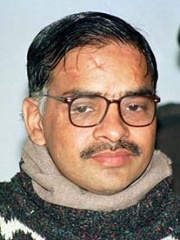

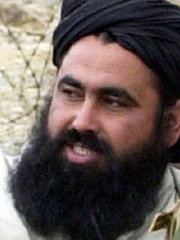
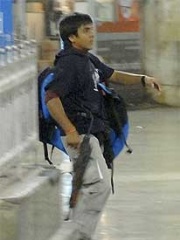
The Most Famous
EXTREMISTS from Pakistan
This page contains a list of the greatest Pakistani Extremists. The pantheon dataset contains 283 Extremists, 6 of which were born in Pakistan. This makes Pakistan the birth place of the 9th most number of Extremists behind Russia, and Japan.
Top 6
The following people are considered by Pantheon to be the most legendary Pakistani Extremists of all time. This list of famous Pakistani Extremists is sorted by HPI (Historical Popularity Index), a metric that aggregates information on a biography's online popularity.

1. Khalid Sheikh Mohammed (b. 1964)
With an HPI of 60.40, Khalid Sheikh Mohammed is the most famous Pakistani Extremist. His biography has been translated into 44 different languages on wikipedia.
Khalid Sheikh Mohammed (born 14 April 1965; Urdu: خالد شیخ محمد; sometimes also spelled Shaykh; and known by at least 50 pseudonyms including his initials KSM), is a Kuwaiti-born Pakistani terrorist, and the former head of propaganda for al-Qaeda. As of 2025, he is held by the United States at the Guantanamo Bay detention camp under terrorism-related charges. He was named as "the principal architect of the 9/11 attacks" in the 2004 9/11 Commission Report. Mohammed was a member of Osama bin Laden's terrorist organization al-Qaeda, leading al-Qaeda's propaganda operations from around 1999 until late 2001. Mohammed was captured on 1 March 2003, in the Pakistani city of Rawalpindi by a combined operation of the U.S. Central Intelligence Agency (CIA) and Pakistan's Inter-Services Intelligence (ISI). Immediately after his capture, Mohammed was extraordinarily rendered to secret CIA prison sites in Afghanistan, then Poland, where he was interrogated and tortured by U.S. operatives. By December 2006, he had been transferred to military custody at Guantanamo Bay detention camp. Mohammed is widely regarded as the chief planner of the September 11 attacks. He also participated in planning the Richard Reid shoe bombing attempt to blow up an airliner; the 2002 Bali bombings in Indonesia; the 1993 World Trade Center bombing; the murder of Daniel Pearl and various foiled attacks as well as numerous other crimes. He was charged in February 2008 with war crimes and murder by a U.S. military commission at the Guantanamo Bay detention camp, which could carry the death penalty if convicted. In 2012, a former military prosecutor criticized the proceedings as insupportable due to confessions gained under torture. A 2008 decision by the United States Supreme Court had also drawn into question the legality of the methods used to gain such admissions and the admissibility of such admissions as evidence in a criminal proceeding. On 30 August 2019, a military judge set a date of 11 January 2021 for Mohammed's death penalty trial. His trial was further postponed on 18 December 2020, due to the COVID-19 pandemic. Mohammed's trial restarted on 7 September 2021 but was postponed again for years of plea deal negotiations. On 31 July 2024, Mohammed agreed to plead guilty in exchange for a life sentence rather than a death-penalty trial. His plea deal was revoked by Secretary of Defense Lloyd Austin two days later. In July 2025, the plea deal was voided by a D.C. appeals court in a 2–1 ruling.

2. Javed Iqbal (1961 - 2001)
With an HPI of 53.64, Javed Iqbal is the 2nd most famous Pakistani Extremist. His biography has been translated into 17 different languages.
Javed Iqbal Mughal (1961 – 8 October 2001) was a Pakistani serial killer and child molester who confessed to the sexual abuse and murder of 100 young boys, ranging in age from 6 to 16. His victims were strangled, dismembered, and then dissolved in acid to destroy any evidence.

3. Fazlullah (1974 - 2018)
With an HPI of 49.92, Fazlullah is the 3rd most famous Pakistani Extremist. His biography has been translated into 16 different languages.
Fazal Hayat (1974 – 15 June 2018), more commonly known by his pseudonym Mullah Fazlullah (Pashto/Urdu: ملا فضل اللہ), was an Islamist jihadist militant who was the leader of the Tehreek-e-Nafaz-e-Shariat-e-Mohammadi, and was the leader of the Tehreek-e-Taliban Pakistan in Swat Valley. He became the emir of the Tehrik-i-Taliban Pakistan in 2013, and presided over the descent of the group into factions who are often at war with each other. Fazlullah was designated by the Al-Qaida and Taliban Sanctions Committee of the Security Council in 2015, and was added to the U.S. State Department's Rewards for Justice wanted list on 7 March 2018. Fazlullah was killed in June 2018 by a U.S. drone strike in Kunar, Afghanistan.

4. Baitullah Mehsud (1974 - 2009)
With an HPI of 45.53, Baitullah Mehsud is the 4th most famous Pakistani Extremist. His biography has been translated into 24 different languages.
Baitullah Mehsud (c. 1970 – 5 August 2009) was a Pakistani militant. He was one of the founders and a leader of the Pakistani Taliban (TTP) in Waziristan. He formed the TTP from an alliance of about five militant groups in December 2007. He is thought by U.S. military analysts to have commanded up to 5,000 fighters and to have been behind numerous attacks in Pakistan including the assassination of Benazir Bhutto which he and others have denied. Disagreement exists over the exact date of the militant's death. Pakistani security officials initially announced that Baitullah Mehsud and his wife were killed on 5 August 2009 in a U.S. Central Intelligence Agency drone attack in the Zangar area of South Waziristan. Interior Minister Rehman Malik delayed giving official confirmation and asked for patience and an announcement by Inter Services Public Relations (ISPR) or other agencies. Kafayat Ullah, a TTP source, also announced the death of the militant in the strike, as did his deputy Faqir Mohammed. Later Tehrik-i-Taliban Pakistan commander Hakimullah Mehsud denied previous TTP announcements and said Mehsud was in good health. Major General Athar Abbas, ISPR spokesman, and Robert Gibbs of the White House said his death could not be confirmed, U.S. National Security Adviser James L. Jones also claimed that there was "pretty conclusive" evidence that proved Baitullah Mehsud had been killed and that he was 90% sure of it. On 23 August 2009, Hakimullah Mehsud and Wali-ur-Rehman telephoned the BBC to say that Baitullah Mehsud had died on 23 August 2009 due to injuries sustained during the 5 August attack. On 30 September 2009, the BBC received a video that showed the body of Mehsud. Syed Saleem Shahzad, writing in the Asia Times, described Baitullah Mehsud as a physically small man, with diabetes.
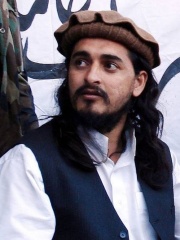
5. Hakimullah Mehsud (1979 - 2013)
With an HPI of 42.59, Hakimullah Mehsud is the 5th most famous Pakistani Extremist. His biography has been translated into 24 different languages.
Hakimullah Mehsud (born Jamshed Mehsud; c. 1978–1981 − 1 November 2013), also known as Zulfiqar Mehsud, was a terrorist who was the second emir of Tehrik-i-Taliban Pakistan from 2009 to 2013. It was confirmed by TTP that he was killed in a U.S. drone strike in Pakistan on 1 November 2013. He had previously been deputy to commander Baitullah Mehsud and one of the leaders of the militant group Fedayeen al-Islam prior to the elder Mehsud's death in a CIA drone missile strike, and in TTP he had been commander in the Khyber, Kurram and Orakzai agencies of Pakistan. He was described as being born about 1979 and a cousin of Qari Hussain. He was known to be a young and aggressive field commander, who previously served as a driver and was very close to Baitullah Mehsud. He maintained ties to al-Qaeda, the Afghan Taliban and various Pakistani jihadist groups, such as Lashkar-e-Taiba, Lashkar-e-Jhangvi, and Jaish-e-Mohammed.

6. Ajmal Kasab (1987 - 2012)
With an HPI of 42.02, Ajmal Kasab is the 6th most famous Pakistani Extremist. His biography has been translated into 25 different languages.
Muhammad Ajmal Amir Kasab (Urdu: اجمل قصاب; 13 July 1987 – 21 November 2012) was a Pakistani militant and a member of the Islamist militant organization Lashkar-e-Taiba through which he took part in the 2008 Mumbai terrorist attacks in Maharashtra, India. Kasab, alongside fellow Lashkar-e-Taiba recruit Ismail Khan, killed 72 people during the attacks, most of them at the Chhatrapati Shivaji Terminus. Kasab was the only attacker who was apprehended alive by the police. Kasab was born in Faridkot, Pakistan and left his home in 2005, engaging in petty crime and armed robbery with a friend. In late 2007, he and his friend encountered members of Jama'at-ud-Da'wah, the political wing of Lashkar-e-Taiba, distributing pamphlets, and were persuaded to join. On 3 May 2010, Kasab was found guilty of 80 offences, including murder, waging war against India, possessing explosives, and other charges. On 6 May 2010, he was sentenced to death on four counts and to life imprisonment on five counts. Kasab's death sentence was upheld by the Bombay High Court on 21 February 2011. The verdict was upheld by the Supreme Court of India on 29 August 2012. Kasab was executed by hanging on 21 November 2012 at 7:30 a.m. local time, and subsequently buried within the precincts of Yerwada Central Jail in Pune. He was the first person to be executed in India since 2004.
People
Pantheon has 6 people classified as Pakistani extremists born between 1961 and 1987. Of these 6, 1 (16.67%) of them are still alive today. The most famous living Pakistani extremists include Khalid Sheikh Mohammed. The most famous deceased Pakistani extremists include Javed Iqbal, Fazlullah, and Baitullah Mehsud.
Living Pakistani Extremists
Go to all RankingsDeceased Pakistani Extremists
Go to all RankingsJaved Iqbal
1961 - 2001
HPI: 53.64
Fazlullah
1974 - 2018
HPI: 49.92
Baitullah Mehsud
1974 - 2009
HPI: 45.53
Hakimullah Mehsud
1979 - 2013
HPI: 42.59
Ajmal Kasab
1987 - 2012
HPI: 42.02
Overlapping Lives
Which Extremists were alive at the same time? This visualization shows the lifespans of the 5 most globally memorable Extremists since 1700.

